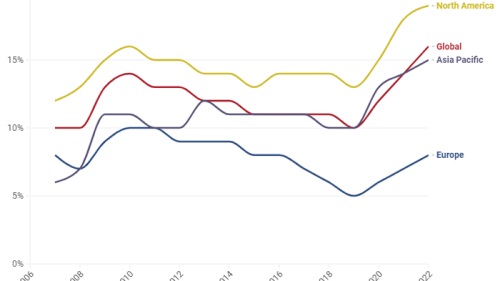While commercial real estate has occasionally lagged behind other business sectors in use of emerging technologies such as three-dimensional virtual reality environments and real-time data mining, panelists at the ULI Fall Meeting said such advances promise to reshape how developers and property managers function.
“Developers haven’t traditionally allocated budget for software,” said panel moderator Jared Kushner, founder and chief executive officer of New York development firm Kushner Companies. “But now it’s exploding.” Kushner said he recently donned a helmet made by Oculus VR, a cutting-edge virtual reality gear maker acquired by Facebook, to take a virtual-reality tour of Related Companies’ Hudson Yards development. “It made me dizzy,” Kushner noted, “but it was cool.”
To executives accustomed to thinking of their business as bricks and mortar rather than data, such technology might seem like just a novelty. But Dave Eisenberg, founder and chief executive officer of 3-D modeling firm Floored, who convinced Kushner to put on the helmet, has closed 80 engagements this year with developers who see the value of being able to visualize and even explore projects before they are built. Eisenberg said his company’s software, which converts 2-D plans into a 3-D environment, allows viewers to look at everything from window views to how different sorts of flooring and ceilings would look. He said the software can even allow developers to see which trees could be put in landscaping.
Eisenberg said that while such emerging technologies “can go down a rabbit hole of being cool for cool’s sake,” a strong case can be made that 3-D visualization will make for better projects and control costs because design flaws can be spotted and fixed in advance. But it also promises to boost leasing velocity because it enables tenants to see how they would fit into a space and to adapt it to suit their requirements. “Shouldn’t every leasing presentation in the future be customized to the tenant you’re talking to?” Eisenberg asked. “These are things you can do with virtualization.”
Riggs F. Kubiak, founder and chief executive officer of Honest Buildings, touted his company’s web-based marketplace for various construction specialties, ranging from electrical contractors to structural engineers, which has been called a cross between Linkedin and Yelp for building professionals.
Kubiak said the site, which allows developers to find contractors who worked on various buildings and evaluate their backgrounds for relevance to a new project, has the potential to dramatically reduce costs as well.
“If I’m looking for an architect with experience in ground-up lobby work and renovation in Brooklyn, I can find him,” Kubiak explained. “I can make a decision based upon the relevant experience of that team.”
Honest Buildings’ database, which lists 10,000 contractors in the New York area, uses publicly available data from permits and other sources to build out the profiles. “We can see a very rich project history,” Kubiak said. “You also get price intelligence and efficiency. . . . We’ve really rethought the way decisions are being done.”
The site is valuable to contractors as well because it enables them to gain the attention of developers with whom they have no previous history. “Vendors have one thing in common,” Kubiak said, “they want to do interesting projects. But it’s challenging to get in front of those decision makers at a time when the decisions are being made. The vendor community spends time trying to access relevant deals. . . . But now they also can pick the owners they want to work with.”
Another company with game-changing potential is Hightower, which provides a platform allowing property managers to track marketing and leasing efforts in real time across their entire portfolios. Founder and chief executive Brandon Weber said the real estate industry was ripe for disruption because many firms still struggled to manage such data with simple tools like Excel spreadsheets. As a result, relevant data became trapped in the computers of local managers, and top executives were unable to see across the enterprise to analyze trends and look for problems or potential advantages.
But with Hightower’s product, executives can spot relevant data easily. “Why is this building getting 30 tours a month while this one is only getting 15?” Weber said. “You’ll be able to see that.”
Hightower tracks everything from proposal terms to demand and inventory. “We think of real estate as a data-driven industry that doesn’t know it yet,” he said.
In addition to software, hardware also can confer a crucial advantage, said Arie Barendrecht, founder and chief executive officer of WiredScore, which evaluates buildings for the quality of their internet connectivity and confers ratings that prospective tenants can use as a guide. Barendrecht noted that many property owners knew surprisingly little about their fiber-optic infrastructure and its possible weaknesses. “They don’t know the carriers, they don’t know the location of the fiber,” he said. “One landlord thought he had fiber in his building, but it turned out that it was out in the street.”
Barendrecht said property owners could turn strong connectivity scores into a marketing inducement because tenants know it makes a critical difference in workplace productivity. WiredScore also has migrated into the consulting business. Owners “are realizing, ‘Our connectivity sucks. What can we do?’ So we’ve created an advisory function.”





